How to Develop an Employer Branding Strategy
Why should someone be interested in working for your company?
The answer to this question should be the main focus of your employer branding strategy. You likely have mission and vision statements for your organization, but this isn’t enough to attract ideal candidates to work for you.
Employer branding helps you position your organization as an attractive employer in the labor market. And clear and compelling employer brand messaging will help your organization stand out from competitors. You need to create a strong narrative surrounding your brand so top talent (and your current employees) want to join in on the journey.
According to LinkedIn’s Global Talent Trends, “candidates consider compensation and benefits their top priority.” A balance between work and personal life, flexible work arrangements, and opportunities for upskilling and career growth round out the top five priorities that candidates value in this current labor market.
“These days candidates are looking for companies that will value their whole selves and provide support in achieving work-life balance. As talent leaders, we need to be prepared to speak to candidates about what our organizations value and how we support our employees. And this isn’t just a hiring strategy – it’s key to ensuring we retain our best talent, as well” says Jennifer Shappley, LinkedIn’s VP of Global Talent Acquisition.
What benefits do you provide to your employees? What sets your company culture apart from others? Questions like these will help you determine the direction to take your employer branding.
So, why should you invest in employer branding? Having a strong employer brand makes it easier:
-
To engage with potential candidates
-
For managers to motivate their teams
-
To craft a convincing message so people buy into and support your organization
We’ll define what employer branding is and why it’s important. Plus, we’ll share the steps to construct an employer branding strategy to help you build an employer brand that current employees and potential candidates will be proud of.
What Is Employer Branding?
Employer branding refers to your organization’s identity as it relates to the organization’s reputation and perception by job seekers and employees. The main benefit of effective employer branding is talent attraction and talent acquisition — it simplifies your recruitment process and makes it easier to retain employees. Your employer branding is what sets your organization apart from others and boosts your brand perception as a strong employer.
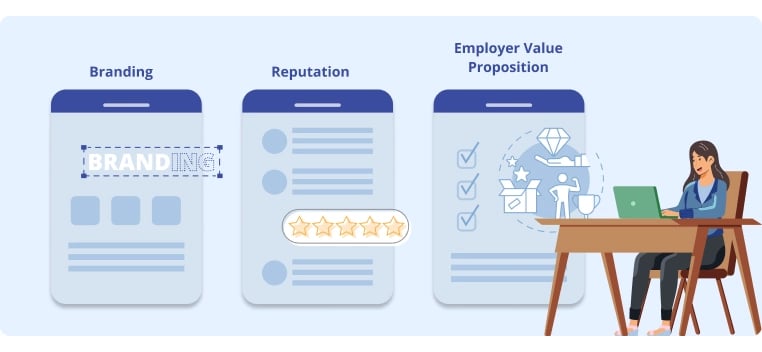
Job candidates look at a company’s employer branding, overall reputation as a place to work, and the employer value proposition when determining which workplaces they’d like to join. The employer value proposition is a key component of employer branding. It outlines the benefits employees will receive in return for their hard work, skills, and expertise.
Not only will your employer branding efforts help you attract and retain top talent, but they will also help you craft a brand that current employees support too. Much of the employer branding messaging is shared on a company’s website, LinkedIn profile, social media channels, and more.
Why Employer Branding Is Important
Here are a few of the key benefits of employer branding:
1. Reduced recruitment and hiring costs
Employer branding reduces the amount you need to spend on recruitment marketing and decreases the cost per hire. LinkedIn Talent Solutions found that a strong employer brand can reduce the cost per hire by 50%. This means you’ll have the opportunity to allocate your budget to other priorities that will improve your employee experience and further support your employer branding.
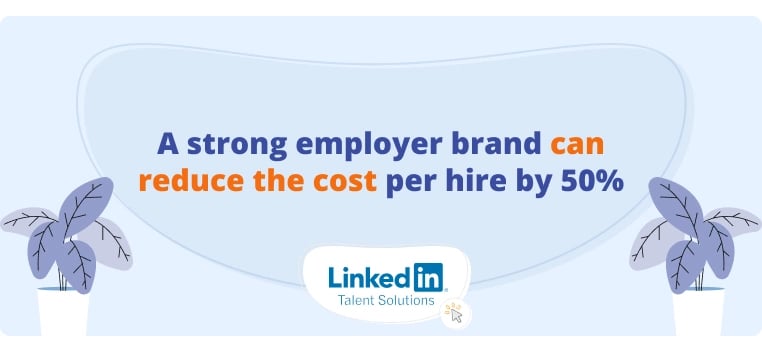
2. Makes employee recruitment easier
Did you know that 86% of job seekers research company reviews before applying for a job? The goal of your employer branding is to make sure your current employees are supported by and supportive of your employer brand. This way potential candidates will see positive ratings and reviews from your employees and be more inclined to apply for a position with your company.
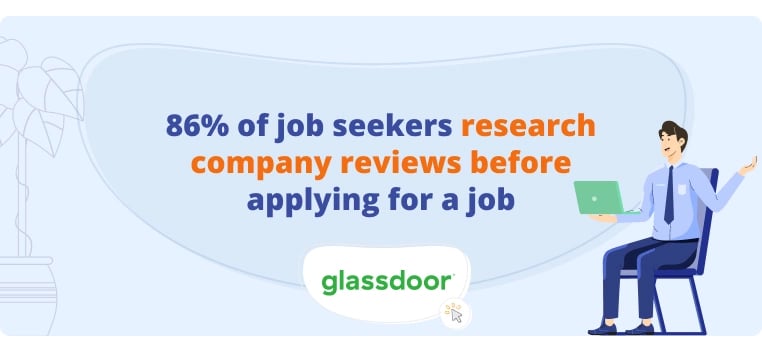
3. Less employee turnover
With a strong employer brand reputation, your employees will be less likely to seek job opportunities at other companies. In fact, 50% of job seekers say they wouldn't work for a company with a bad reputation. And almost 30% of job candidates left a job within the first 90 days of starting due to misalignment between themselves and the employer brand.
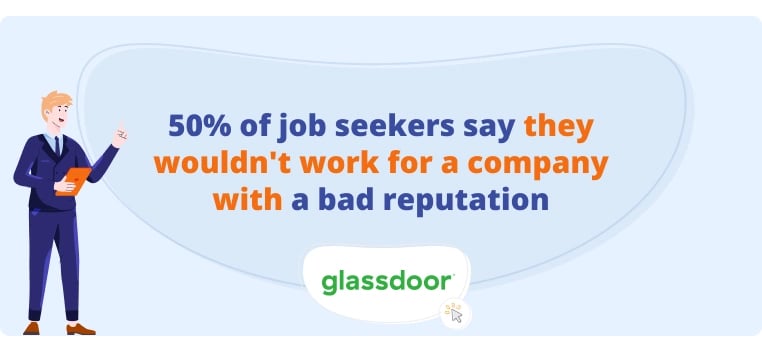
When you have effective employer branding and your employees are asked the question, “Where do you work?”, they’ll be proud to say they work for a company that aligns with their personal values and supports them.
4. Increased employee engagement
A solid employer brand creates deeper meaning for employees and will boost employee engagement. When employees are passionate about the work they do and the values of their organization, they’re more likely to spread the word about your employer brand and the benefits they receive in return for their work.
They’ll use employee engagement tools to share social media posts relating to their organization and will amplify your brand organically. This increases the likelihood that they’ll have career conversations with people who might be passive candidates. But it will make it more likely that they’ll have an in-depth conversation or apply to your open roles.
5. Boost in employee productivity
With an employer branding strategy, your employees will have a clear idea of the direction and values of your company. An employer brand provides meaning and employees will have a greater purpose.
They’ll be more present in their work, which leads to increased effectiveness because they’re excited about the work they’re doing.
Employer Branding Strategy
An employer branding strategy is a process of solidifying your employer brand messaging, aligning it with the overall organizational brand strategy, and marketing your employer branding to existing employees and a wider audience of potential candidates.
When you clarify your employer branding through an employer branding strategy, it makes it easier to explain what your company values are and how you work. And it makes it easy for employees to support your organization and vision, and share your message.
1. Identify the Key Elements That Make Your Organization Unique
What sets you apart from competitors in your industry who might be trying to recruit similar employees? This is something you and your executive team should solidify before creating an employer brand strategy.
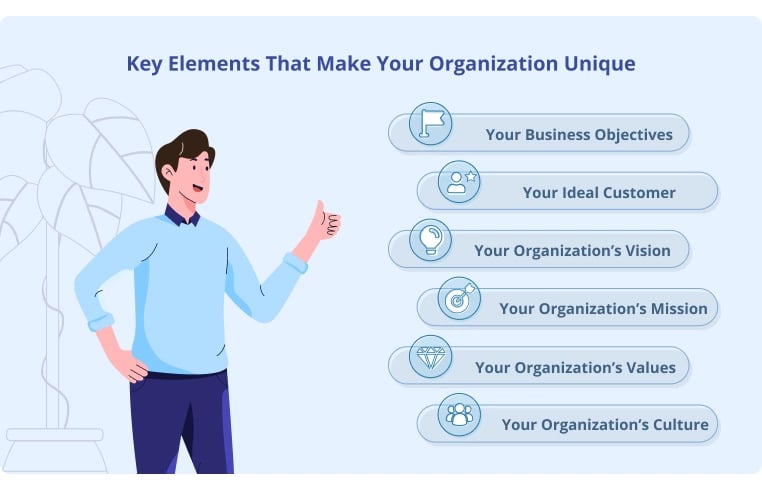
Here are a few things to consider:
-
Business: What are your business objectives?
-
Customer: Who is your ideal customer and how do you serve them?
-
Vision: Where is your organization headed in the short term and long term?
-
Mission: What is your company’s purpose?
-
Values: Which guiding principles help you achieve your business goals?
-
Culture: What are the attitudes and behaviors of your employees and organization that support how everyone interacts and works together on a day-to-day basis?
Knowing the intricacies of your business will make it easier to craft a compelling employer brand.
2. Send Out an Employer Branding Survey
Poll current employees about their perception of the organization. Send out an employer branding survey and ask a few questions to help you get a better idea of the effectiveness of your current employer brand messaging.
Here are a few questions to ask as you develop your employer branding survey:
-
Can employees repeat your employer brand messaging back to you?
-
Are your employees confused by the company’s organizational goals?
-
What attracted them to your company?
-
What do they value in a workplace or job?
-
What do they like about your company culture?
-
What are the key factors they consider when applying for new jobs?
-
What changes would they like to see to make your company a better workplace?
Are there common themes throughout the positive and negative reviews you receive from the employer branding survey? Take note and lean into strengthening the positive aspects of your employer brand and improve on the negative aspects. Through employee polling, you’ll be uplifting employee voices with your employer brand strategy.
Bonus tip: Take a look at external review websites like Comparably, Glassdoor, and Indeed to help inform your employer branding strategy. You can get a pulse on current and former employees’ perceptions of your organization and CEO approval through their reviews.
3. Create an Employer Value Proposition (EVP)
An employer value proposition (EVP) is a key component of employer branding. It encompasses all aspects of an organization’s mission, values, culture, and vision. The employer value proposition should outline all the benefits your organization provides to its employees (ex. Company culture, flexible work arrangements, employee perks and benefits, unique company events, etc.).

The EVP is where you can outline what differentiates your company from competitors. Why should someone work for your company instead of another? With the information you gathered from your employer branding survey, determine the unique offerings you can incorporate into your employer value proposition.
4. Make a Plan for Marketing Your Employer Branding
Make your messaging clear and repeatable. Everyone in your organization (executives, managers, individual contributors, etc.) should easily be able to communicate your brand messaging.
Make sure they’re aware of your employer value proposition (EVP) and all the benefits available to them and future employees. Use training, coaching, and internal communications to prepare your team with messaging surrounding your employer branding so they can become brand ambassadors.
An employee advocacy program is a great way for employees to organically share your brand messaging. When employees are passionate about the work they’re doing and supportive of the company they work for, they’ll be more likely to share their positive experiences on social media.
This way, you’ll amplify your social media reach and boost engagement, save money on paid social media marketing and advertising, and attract great-fit people to your company.
5. Assess the Success of Your Employer Branding Strategy
Once you’ve implemented your employer branding strategy, determine what’s working well and what could be improved.
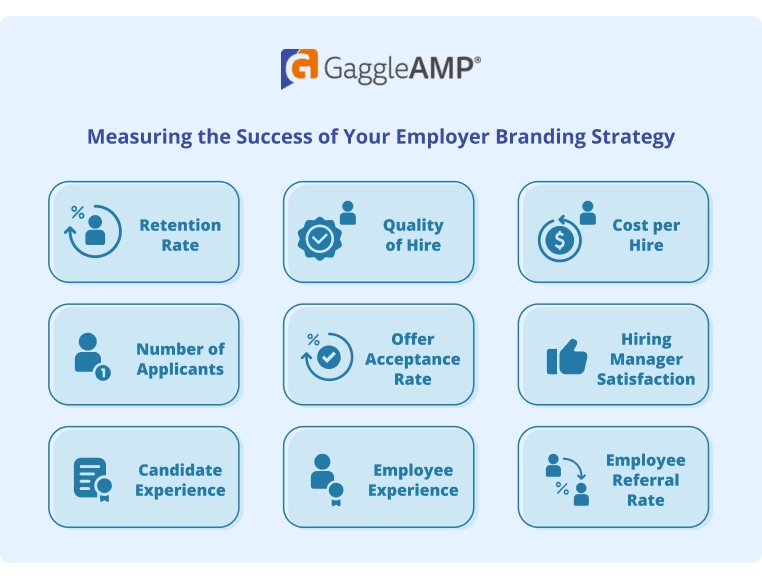
Key metrics and indicators to keep an eye on include:
-
Retention rate
-
Quality of hire
-
Cost per hire
-
Number of applicants
-
Offer acceptance rate
-
Hiring manager satisfaction
-
Candidate experience
-
Employee experience
-
Employee referral rate
Schedule regular times to evaluate the success of your strategy and adjust as needed. This way, you’ll improve the recruiting and hiring processes, make excellent hires, and retain employees.
Employer Branding Examples
Let’s take a look at a few companies that excel at employer branding.
1. Chewy
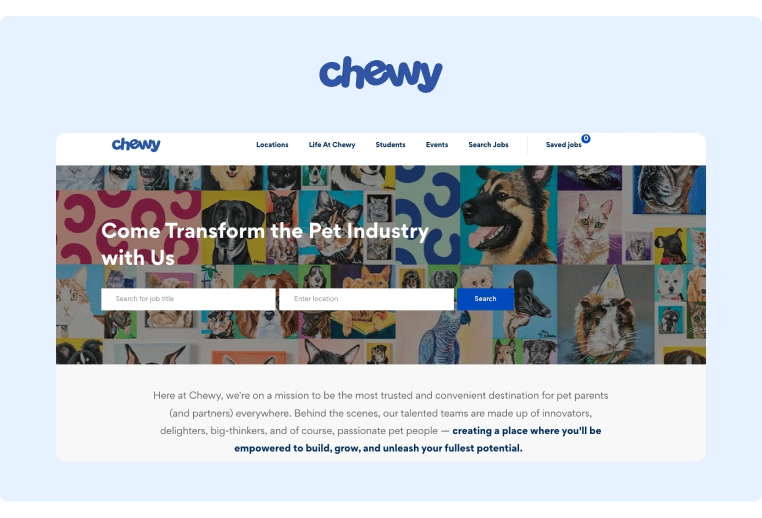
Chewy is known for the excellent customer support it provides for pet parents. But the company also has an excellent employer brand. But what do employees receive in return for working for Chewy? The careers page proudly displays the tagline, “creating a place where you’ll be empowered to build, grow, and unleash your fullest potential.”
Kara Hendrick, Senior Employer Brand Manager at Chewy, emphasizes investing in culture and finding internal champions to raise awareness about your company brand and the opportunities available to candidates and employees. The LifeAtChewy social media accounts showcase employee stories so people can “meet the joy makers, big thinkers, and bold innovators of Chewy who are transforming the pet industry.”
2. HubSpot
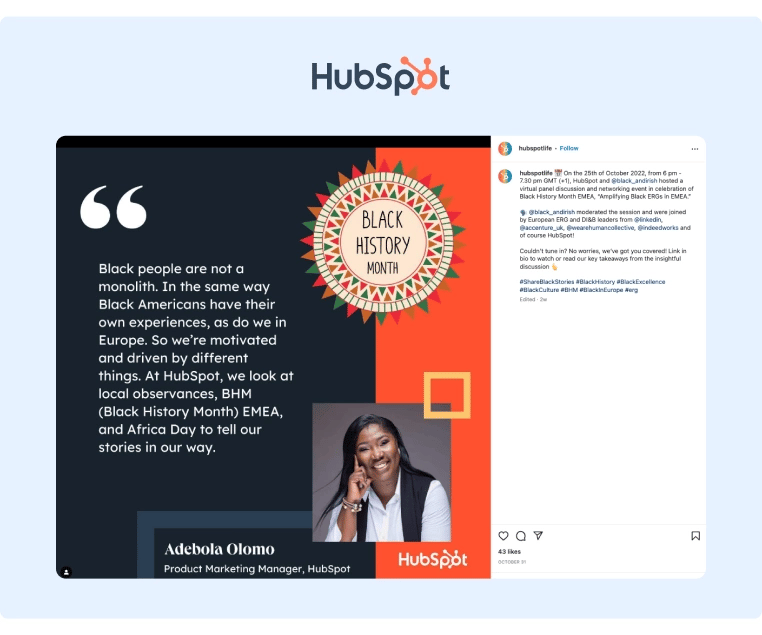
HubSpot includes a bold headline on its careers page to highlight its employer value proposition, “Let's grow together.” The company also has a culture code that has been adapted over the years to best fit the current work landscape and match what people are looking for in an employer.
Employee voices are supported and amplified through social media via the HubSpotLife Instagram account and #hubspotlife hashtag on social media. This way, potential employees can get a glimpse of what their lives could look like if they chose to work at HubSpot. The company also has a Careers Blog that spotlights employees through Q&A-style blog posts.
3. Canva
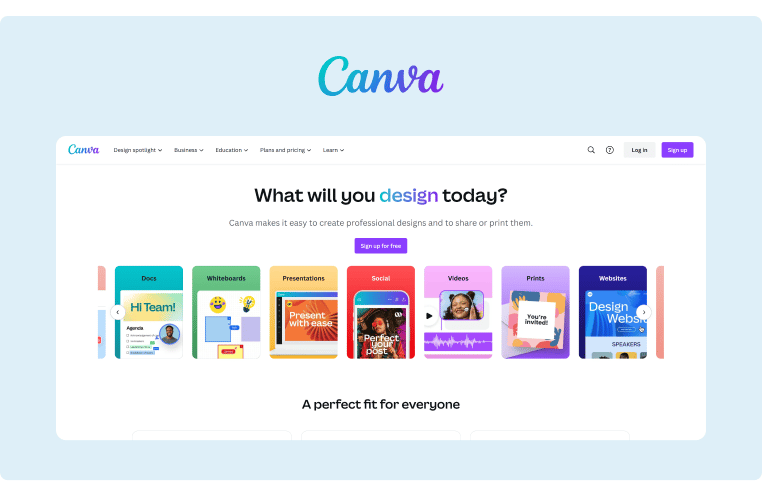
Canva’s career website presents its company values prominently and also features a fun video of employee testimonials that give candidates a glimpse into what their lives could look like if they worked at the company. It also features an entire page titled “How we hire” to make the hiring process transparent for those who apply.
The #CanvaLife hashtag on social media gives employees a place to share their experiences and connect with people who might be interested in working for Canva.
4. Wistia
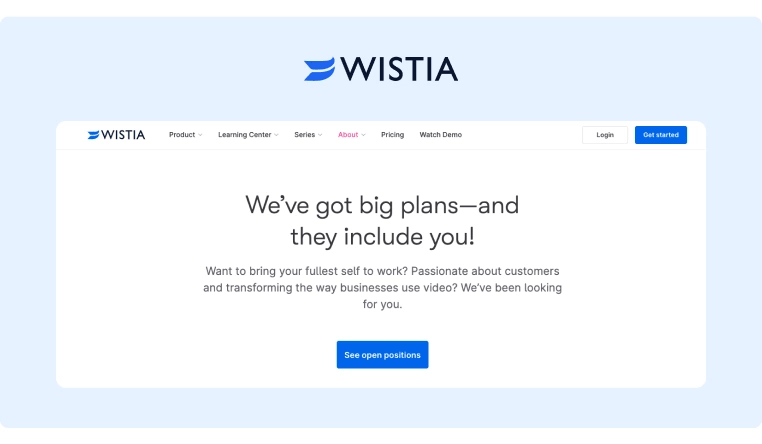
Not only does Wistia have an excellent Culture Score on Comparably, but it also has an effective careers page. It uses the main headline of the career page to speak directly to candidates and clearly states the kinds of employees the company is looking to hire:
“We’ve got big plans—and they include you! Want to bring your fullest self to work? Passionate about customers and transforming the way businesses use video? We’ve been looking for you.”
The page also highlights the key perks and benefits that matter most to current and future Wistia employees. For those looking to learn more, candidates can explore the Wistia Values page which shares the company’s core values alongside photos of happy Wistia employees. The page ends with a strong call to action to encourage candidates to apply.
“Do these values resonate with you? We’d love to hear from you! We’re always on the lookout for motivated, curious, and creative people who are excited about transforming the way businesses use video.”
5. Datadog
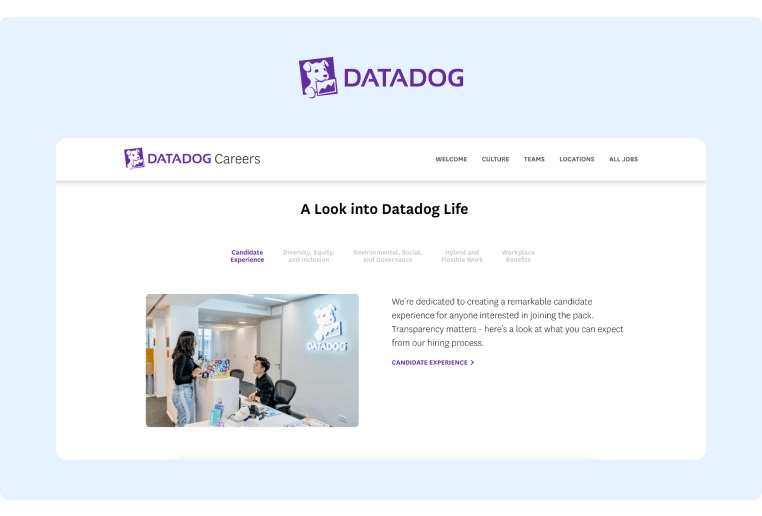
On Datadog’s careers page, the company clearly highlights what candidates can expect from the hiring process, as well as key causes the company cares about, and the benefits that are available to employees.
When creating an employer brand of your own, Riley Stefano, Global Leader of Recruitment Marketing & Employer Brand at Datadog, recommends empowering your employees to share your brand messaging by creating their own personal brands. They can share more about their career paths, workplace experiences, and the lessons they’ve learned along the way.
Similar to Chewy, HubSpot, and Canva, Datadog also uses social media to highlight employees’ experiences with the company. Curious candidates can explore the #DatadogLife hashtag to see what life is like for Datadog employees to help them determine if the company would be a good fit for them.
A clear brand message makes it easier to market your organization to potential employees. This leads to growth for your organization and results in employees who are committed to your organization and its goals. With strong employer branding, you'll attract great candidates, make better hires, and retain top talent.
Are you ready to uplevel your employer branding? GaggleAMP's employee advocacy platform helps your marketing team reach a wider audience of potential candidates (and customers) by leveraging your employees’ social media channels to increase brand awareness.











